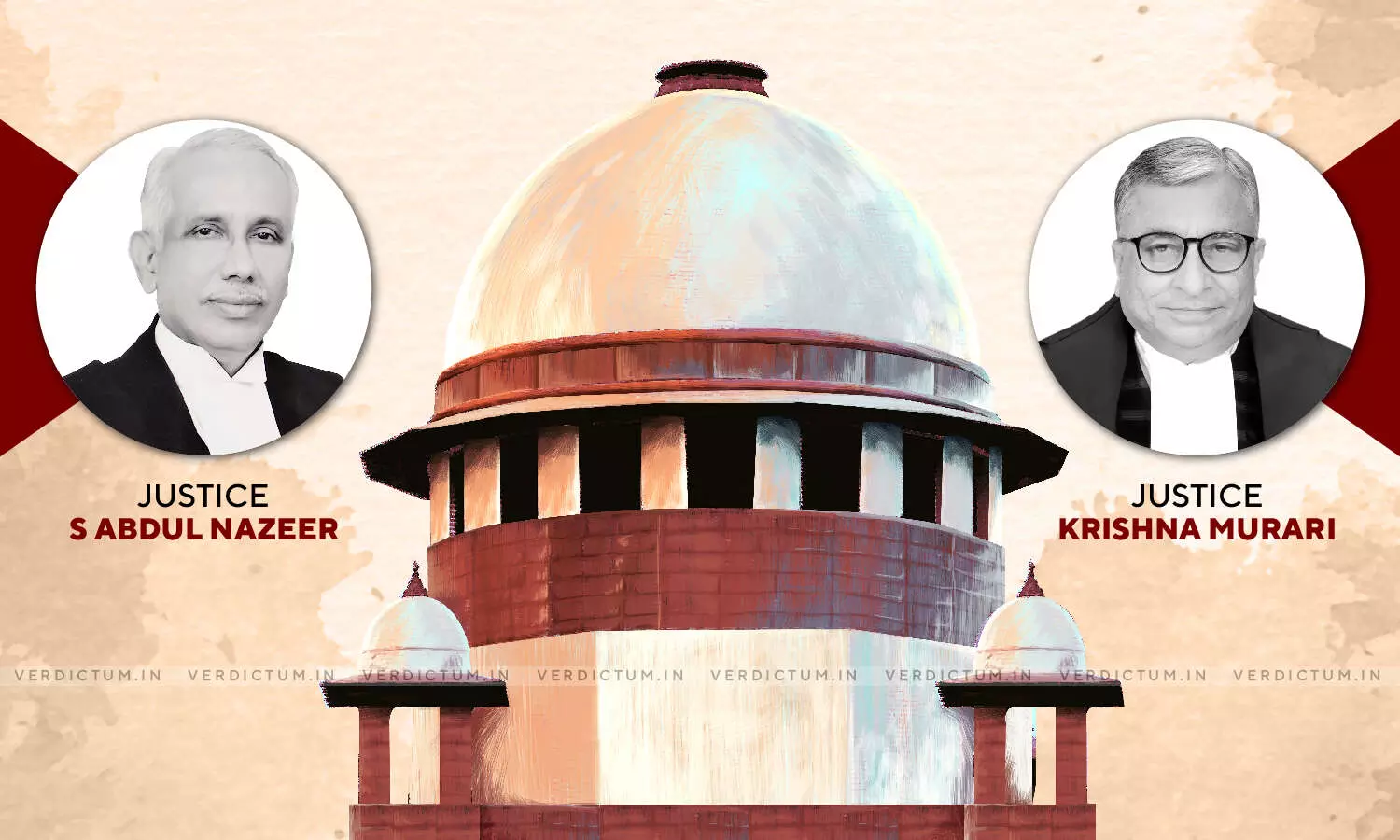
Section 498A IPC Ought Not To Be Used As Instrument To Settle Personal Score Against Husband And His Relatives - Supreme Court
 |
|A two-judge bench of Justice S Abdul Nazeer and Justice Krishna Murari observed that the relatives of the complainant's husband could not be forced to undergo trial based on general and omnibus allegations u/S 498A IPC. Moreover, the Court opined that provisions such as 498A IPC ought not to be used as instruments to settle personal scores against the husband and his relatives.
In this case, the complainant - wife instituted a criminal complaint against her husband and the Appellants before the Court of Chief Judicial Magistrate, Purnea alleging demand for dowry and harassment. Thereafter, the Sub Divisional Judicial Magistrate Court, Purnea, concluded that upon perusal of material evidence, no prima-facie case was made against the in-laws and that the allegations leveled against them were not specific in nature. Subsequently, the complainant - wife, gave another written complaint about registration of FIR under sections 341, 323, 379, 354, 498A read with Section 34 IPC against her husband and the Appellants herein.
The husband and Appellants herein filed a criminal writ petition before the Patna High Court, which was dismissed. This impugned judgment was challenged before the Apex Court.
Counsel Smarhar Singh appeared for the complainant while Counsel, Samir Ali Khan represented the appellants before the Supreme Court.
The primary issue in this case was -
- Whether allegations made against the Appellants were in the nature of general omnibus allegations and therefore liable to be quashed?
It was contended by the Appellants that previously in the year 2017, the complainant had instituted a criminal complaint on similar allegations, whereby the Judicial Magistrate after considering the evidence, issued summons only against the husband and found that the allegations made against the Appellants herein were omnibus in nature. Further, it was submitted that the FIR in question had been made with a revengeful intent, merely to harass the Appellants, and should be dealt with accordingly according to the case of Social Action Forum for Manav Adhikar & Anr. Vs. Union of India
On the other hand, it was argued by the State of Bihar that the husband of the complainant and Appellants, despite the assurances, had continued their demand for dowry and threatened with forcefully terminating the complainant wife's pregnancy. It was contended on behalf of the complainant-wife that the allegations made in the FIR were serious in nature and she had been repeatedly tortured physically and mentally in order to fulfill the demand for dowry.
The Supreme Court observed that the incorporation of section 498A of IPC was aimed at preventing cruelty committed upon a woman by her husband and her in-laws, by facilitating rapid state intervention. However, it was equally true, that in recent times, matrimonial litigation in the country had also increased significantly and there was a greater disaffection and friction surrounding the institution of marriage. According to the Court, this had resulted in an increased tendency to employ provisions such as 498A IPC as instruments to settle personal scores against the husband and his relatives.
The Court referred to the cases of Rajesh Sharma v. State of U.P, Arnesh Kumar v. State of Bihar, and others to demonstrate the numerous instances wherein the Court had expressed concern over the misuse of Section 498A IPC and the increased tendency of implicating relatives of the husband in matrimonial disputes, without analyzing the long term ramifications of a trial on the complainant as well as the accused. It was further manifested from the said judgments that false implication by way of general omnibus allegations made in the course of matrimonial dispute if left unchecked would result in misuse of the process of law. Therefore, the courts were warned from proceeding against the relatives and in-laws of the husband when no prima facie case was made out against them.
The Court observed that the complainant had alleged that all accused harassed her mentally and threatened her of terminating her pregnancy. Furthermore, no specific and distinct allegations had been made against either of the Appellants herein, i.e., none of the appellants had been attributed any specific role in furtherance of the general allegations made against them. This simply lead to a situation wherein one failed to ascertain the role played by each accused in furtherance of the offence. The allegations were therefore general and omnibus and could at best be said to be made out on account of small skirmishes. However, as far as the appellants were concerned, the allegations made against them being general and omnibus did not warrant prosecution.
The Court opined that in the absence of any specific role attributed to the accused-Appellants, it would be unjust if the Appellants were forced to go through the tribulations of a trial, i.e., general and omnibus allegations could not manifest in a situation where the relatives of the complainant's husband were forced to undergo trial.
Thus, the Supreme Court, set aside the impugned order passed by the Patna High Court as well as the impugned F.I.R. against the appellants under Sections 341, 323, 379, 354, 498A read with Section 34 IPC were quashed. Hence, the appeal was allowed accordingly.
Click here to read/download the Judgment